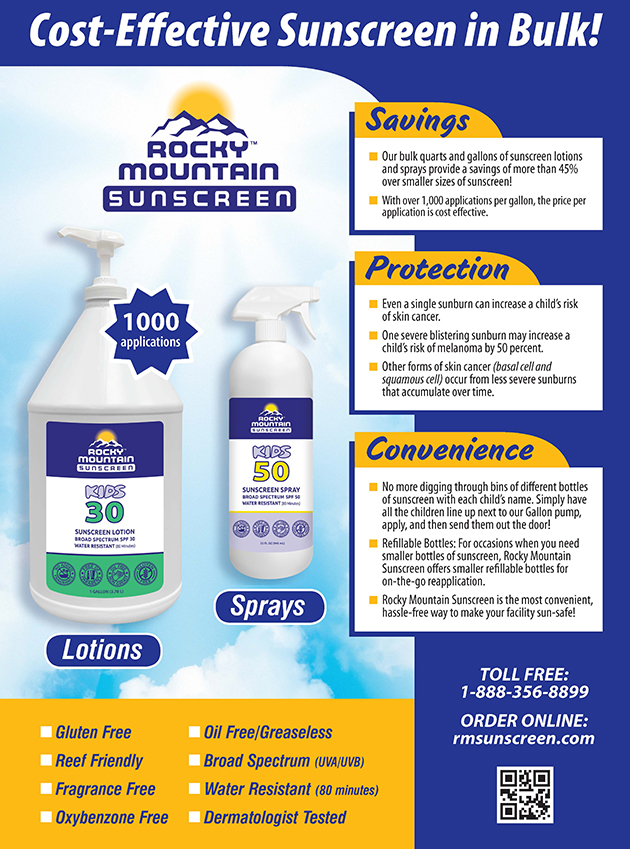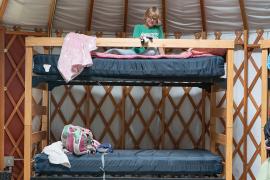Remember when you first were hired for camp? What was your initial response? My first acceptance letter congratulated me on being hired and told me what to bring, important dates, and when staff training would start. The excitement of knowing I would be working at camp made me wonder what the experience would be like and who I might meet.
Fast-forward to my first day. After a long drive, I arrived after dinner only to find what appeared to be a dark and deserted place. I had been hired to be the boating guy, and, while I knew about canoes, rowboats, and sailboats, I knew nothing about my new environment. The person who hired me was not at the designated meeting place and obviously had failed to inform anyone when I would arrive. I wandered around looking for any signs of life and eventually found a cabin, a cot, and a place to sleep. The next morning, I followed several well-traveled paths to the dining hall only to be told to go away because breakfast wasn’t ready.
Quite a start to the summer, wouldn’t you agree? But the real lesson wasn’t what happened, but what that provided. Looking past the feelings of confusion and isolation, the experience gave me the opportunity to further define my leadership skills. While I knew the possibilities for the summer might be great, my inauspicious start opened the door to many questions: Should I stay or go? How much effort do I want to give? If no one cares about me, will my contributions be valued?
Thankfully, these thoughts of bewilderment didn’t last long, and I soon became a respected member of the staff. I realized that each leadership decision we make influences our ability to be effective. Supervisors provide some guidance, but our credibility increases each time we demonstrate characteristics of personal development. All day long we meet people, listen, talk, and make value judgments that our campers and fellow staff, in turn, quickly evaluate.
How long do you think it takes someone to form an opinion about you? If you guessed a few seconds, you’re right! Research suggests first impressions take only seven seconds and sometimes as little as a tenth of a second (Gibbons, 2018).
Each staff person contributes to the culture by how they do their job. While every position in camp has a title, becoming a leader is a designation that you must earn. You accomplish this by acting with consistent behavior and taking time to develop meaningful relationships.
Leadership: What Is It, and What Is It Not?
Let’s start with what leadership is not. It isn’t talking a lot, telling people what to do, or acting from ego. It is doing the right thing, inspiring people to act, applying knowledge learned from experience, and possessing the ability to influence others. Effective leaders can be introverted, extroverted, experienced, new, old, young — anyone with strong values that guide their decisions.
In a study of over 35,000 people, participants were asked to think about the leadership role models in their lives. The survey provided several categories from which their leadership role model might come, including actor, entertainer, coach, coworker, family member, religious leader, athlete, and teacher. Who would you choose? When thinking back over their lives and selecting their most important leadership role models, the respondents overwhelmingly nominated a family member. The next most selected option was a teacher or coach, which implies someone who fosters life skills (Kouzes & Posner, 2021).
Leadership is not a position; it is a relationship. Camp offers the perfect format to practice this skill, because it includes activities where you both lead and follow regardless of your leadership style. The schedule is designed to be age-appropriate and challenging, but the learning model promotes connection and ties action to purpose. People will decide to follow you or not by the quality of relationships you develop, and consistency is key to this process.
Being consistent means you are genuine in your actions, and you understand how to interpret your camp’s mission and temper your own behavior to support the campers. If your natural response to a situation is not going to help resolve the problem, take a step back and alter what you do or say. You will be successful if you balance your ideas and opinions with the understanding that others also feel strongly about matters of principle. Your job is to identify and clarify what the shared values are and habitually demonstrate them.
Regardless of your position, people will follow you if you are honest, inspiring, competent, and dependable. Ultimately, your camp experience will be defined by how well you can align your actions with the group’s shared values. Individual traits such as personality, philosophy, manners, hobbies, and leadership ability will all help to define your experience.
One of the best ways to lead at camp is to show your campers and fellow staff that you have heart. Support their fundamental needs through praise and encouragement. Giving compliments should be part of your daily vocabulary, and showing you care increases the odds that you will receive meaningful feedback. Celebrating actions or accomplishments that support the group’s culture creates a spirit of community, which increases your influence.
The key message here is that you have innate strengths that are important to the camp’s culture. You don’t always have to look to a supervisor or wait for campers to do something in order to practice leadership. You are the one who knows your campers best, so use your natural skills to learn which techniques are effective motivators.
Developing Your Leadership Skills
Practicing leadership through trial and error can be challenging. To help you develop some guidelines for success, try implementing the following practices before or during camp.
- Develop a personal mission (PM) statement. This will help prevent “success slide.” Your PM defines your values and creates boundaries that make decision-making easier. It helps to align your decisions with camp goals. Here are two PM statement examples:
• Come to work prepared to give campers the help and attention they need to be productive, confident, and respectful of others.
• Provide support to senior staff so they can be more effective leaders during program time and special events.
If you have trouble formulating a statement, consider what you are passionate about, and try using an open-ended statement, such as:
• “I want to be one of the best counselors because . . . ”
• “Because of my passion in __________, I want to learn a new skill so I can . . .” - Create a model that identifies your strengths by intersecting camp culture, leadership skills, and values. The intersecting area in the middle is the sweet spot or point of influence (POI). Write down some actions for each and decide how your contributions can benefit camp.
- Try reverse mentoring. This is where counselors and junior counselors help senior staff to appreciate new language, skills, or expertise. Demonstrate your influence by helping others try new things with the intention of bridging the generational gap.
- Say yes. Asking to do more in camp can fast-track your growth. If it is your first year as a camp counselor, show your desire to contribute by emerging as a go-to person when opportunities arise. This gives senior staff a reason to embrace new ideas.
Opportunities to Flex Your Leadership Muscles
Because leadership opportunities occur throughout camp and aren’t tied to job titles or activity areas, you can exercise your character muscles. A what, how, why breakdown will help to explain the process of maximizing your leadership mindset.
What and How
The what is the ability to show your true self by using a set of competencies that can be developed while doing your job. With intentional practice, your leadership can reflect positivity, focus, courage, reliability, and ambition — or your own unique combination of attributes. Demonstrating these qualities will go a long way toward building your reputation as a dependable leader, because they are authentic. When it is hot or people are tired and you lead the way by saying something positive, people notice. If someone needs assistance and you offer help, people notice. When you give extra effort in activities, people notice.
Showing gratitude is another example of how you can exercise a character muscle. Camp is filled with moments in which someone supports you, provides food, or listens. If you verbalize your feelings of thankfulness in return, you keep the cycle of appreciation going.
Why
Your values define your code of conduct and energize your purpose. Think about the traits you admire most in someone you respect. How can you nurture those qualities in yourself and emulate them at camp?
English historian and novelist James Anthony Froude said, “You cannot dream yourself into a character; you must hammer and forge yourself one” (QuoteHD, n.d.). Maximize your own camp experience. Any activity that requires an intentional investment of energy and thought, and pushes you out of your comfort zone, helps to increase your leadership ability.
You want campers and fellow staff to believe you have the capacity to achieve more. It is very refreshing for a supervisor to give you a task and then be impressed when you exceed their expectations. Consistent performance, reliability, and dedication to doing a good job creates trust. This is the secret to having a great summer. Trust can take time to build, but by keeping your promises, admitting your mistakes, actively listening, and showing interest, you can form bonds that last a lifetime.
Trust is the central issue in human relationships. Without trust, you cannot lead. Camp staff who are unable to trust others fail to become good leaders because they struggle with believing what other people say. This void then creates a need for someone else to do the work, which can lead to stress, disappointment, or micromanagement.
Talent Utilization
Supervisors, including camp directors and owners, play a huge part in determining what percentage of your talent gets utilized. In a recent global leadership survey, respondents said their worst leaders utilized only 31 percent of their talents. By contrast, workers with the best leaders indicated they used 95 percent of their talents (Kouzes & Posner, 2021). Regardless of the supervisory hand you are dealt, you can help yourself by finding times during the day when your natural talents will add to or challenge a process. Also, be efficient in performing your daily routine — if you work well with your group of campers and run a tight but enthusiastic ship, you’ll promote meaningful collaboration.
Your task is to find a balance between being good at your job and showing you can do more. Once you get the routine down with a group or specialty area, it can be easy to become complacent. So strive to move from being a good staff member to being a great one. Ask for more responsibility, help on a special event, create a new activity, or engage campers on a rainy day. Use your internal motivation to show what you can do.
The OZ principle, a business philosophy that touts success through personal accountability, says to reach your goals, you must “take initiative and assume accountability.” It lays out these steps for being responsible (Conners, 2004):
- See it.
- Own it.
- Solve it.
- Do it.
A thin line often separates success from failure, but you get to control the narrative by how you approach your job. You don’t have to make big changes to be effective. Try a few small improvements to an established process, and build on your successes. Staff who are unaccountable or unreliable will use phrases such as, “Just ignore it,” “Wait and see,” “We have never done that before,” or, my personal favorite, “It’s not my job.” Don’t let less-motivated staff compromise your purpose.
Your campers won’t follow you very long if you can’t follow yourself. You must believe what you do every day matters. This core value will help you to manage down to the campers and manage up to your supervisor.
You can be great. Leadership is a relationship, and you can be successful if you nurture that relationship through hard work and exercising your character muscles to benefit your campers.
So how did my first summer turn out? I decided to stay, and by implementing our character muscles and focusing on the campers, the waterfront director and I made a little-used activity area a destination location for fun, friendship, and learning. You can do the same!
|
Discussion Questions
|
References
Gibbons, S. (2018, June 19). You and your business have 7 seconds to make a first impression: Here’s how to succeed. Forbes. forbes.com/sites/serenitygibbons/2018/06/19/you-have-7-seconds-to-make-a-first-impression-heres-how-to-succeed/?sh=6f8bd28456c2
Kouzes, J. M., & Posner, B. Z. (2021). Everyday people, extraordinary leadership: How to make a difference regardless of your title, role, or authority. Hoboken, NJ: John Wiley and Sons, Inc.
Connors, R., Smith, T., & Hickman, C. (2010). The OZ principle: Getting results through individual and organizational accountability. New York, NY: The Penguin Group.
QuoteHD. (n.d.). James Anthony Froude quotes. quotehd.com/quotes/james-anthony-froude-historian-you-cannot-dream-yourself-into-a-character-you
Photo courtesy of Cranbrook Schools Summer Camps, Bloomfield, MI.
Greg Cronin, MPA, CCD, CPRP, was a camp director for over 30 years and has been conducting staff trainings since the early 1980s. He is a nationally known conference speaker, consultant, staff trainer, author, former American Camp Association (ACA) National Board member, standards visitor, and corporate trainer with more than 200 clients nationwide. Greg has trained thousands of camp staff on youth development and leadership. He has appeared on TV, radio, and Capitol Hill as a spokesperson for the camp experience and is a frequent contributor to Camping Magazine. Greg is featured in ACA’s By the Expert book series with chapters on leadership and staff training. To book Greg for staff orientations, trainings, and workshops, please call 703-395-6661 or email [email protected].






